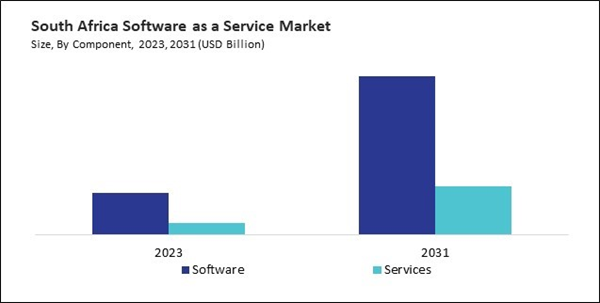The Brazil market dominated the LAMEA Software as a Service Market by country in 2023, and is expected to continue to be a dominant market till 2031; thereby, achieving a market value of $15.85 billion by 2031. The Argentina market is expected to witness a CAGR of 19.5% during 2024-2031. Additionally, the UAE market would register a CAGR of 16.7% during 2024-2031.
With SaaS, businesses do not need to worry about maintaining, upgrading, or patching software. The SaaS provider handles these tasks, ensuring businesses can access the latest features and security updates without manual intervention. SaaS providers often offer high levels of security, including encryption, authentication, and data backup, which may be more advanced than what small businesses could afford with on-premises software. Additionally, SaaS providers offer uptime guarantees and service-level agreements (SLAs), ensuring high levels of availability and reliability.
The market continuously evolves, driven by various trends shaping how businesses adopt and use software. In response to growing demand, SaaS providers increasingly offer specialized, vertical-specific solutions. Vertical SaaS solutions are designed for specific industries such as healthcare, education, retail, and manufacturing, addressing these sectors' unique needs and challenges more effectively than horizontal SaaS applications.
In the UAE, the travel and tourism sector’s substantial contribution of AED 167 billion to the country’s GDP, coupled with high international tourist spending of AED 117.6 billion in 2022, is driving a need for innovative technological solutions to enhance customer experiences, streamline operations, and support growth. SaaS platforms can play a crucial role in the tourism sector by providing solutions for booking management, customer relationship management (CRM), and business intelligence tools that help tourism companies analyze customer preferences, optimize marketing strategies, and improve service delivery. The rise in tourism and the UAE’s push for digital transformation make it a prime market for SaaS solutions tailored to the travel industry. Thus, Brazil's burgeoning EdTech sector and the UAE's thriving travel and tourism industry are creating substantial opportunities for SaaS providers.
Based on Component, the market is segmented into Software and Services. Based on Deployment, the market is segmented into Private Cloud, Public Cloud, and Hybrid Cloud. Based on Application, the market is segmented into Customer Relationship Management (CRM), Enterprise Resource planning (ERP), Content, Collaboration & Communication, Human Capital Management, BI & Analytics, and Other Application. Based on Enterprise Size, the market is segmented into Large Enterprises and Small & Medium Enterprises. Based on Industry, the market is segmented into Banking, Financial Services and Insurance (BFSI), Retail & Consumer goods, Healthcare, Manufacturing, Education, Travel & Hospitality, and Other Industry. Based on countries, the market is segmented into Brazil, Argentina, UAE, Saudi Arabia, South Africa, Nigeria, and Rest of LAMEA.
Market Report Segmentation
By Component- Software
- Services
- Private Cloud
- Public Cloud
- Hybrid Cloud
- Customer Relationship Management (CRM)
- Enterprise Resource planning (ERP)
- Content, Collaboration & Communication
- Human Capital Management
- BI & Analytics
- Other Application
- Large Enterprises
- Small & Medium Enterprises
- Banking, Financial Services and Insurance (BFSI)
- Retail & Consumer goods
- Healthcare
- Manufacturing
- Education
- Travel & Hospitality
- Other Industry
- Brazil
- Argentina
- UAE
- Saudi Arabia
- South Africa
- Nigeria
- Rest of LAMEA
Table of Contents
Companies Mentioned
- Hewlett Packard Enterprise Company
- Microsoft Corporation
- Oracle Corporation
- IBM Corporation
- SAP SE
- Google LLC
- Epicor Software Corporation
- ServiceNow, Inc.
- Salesforce, Inc.
- VMware, Inc. (Broadcom Inc.)









